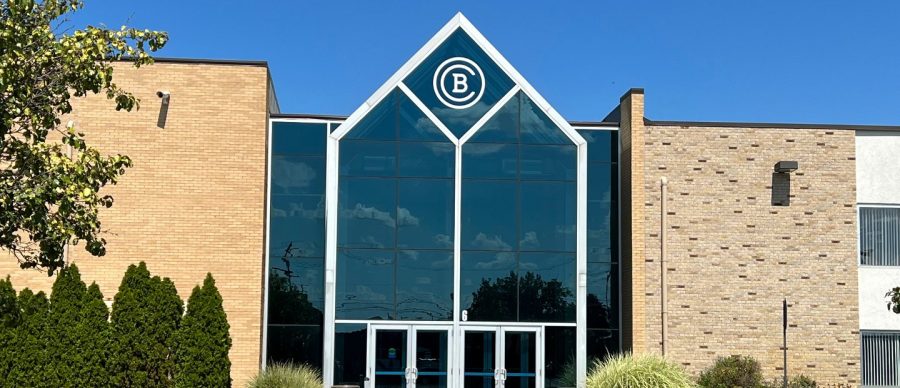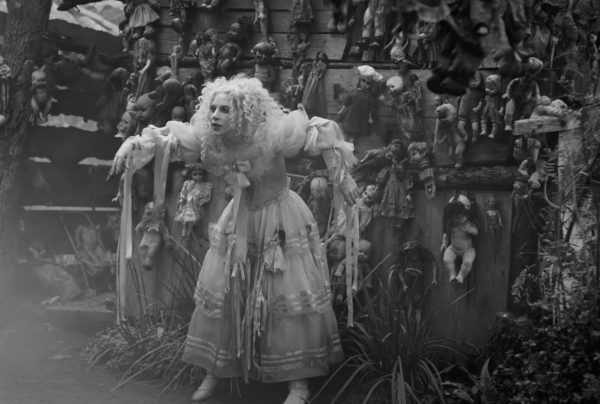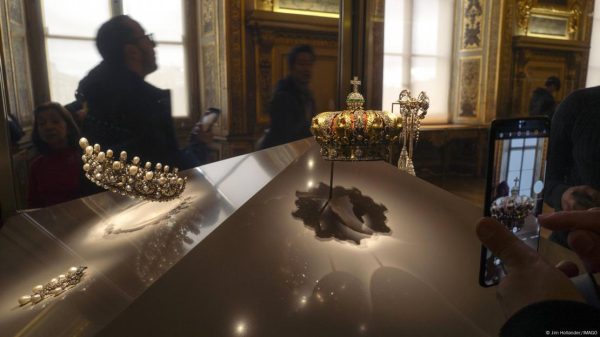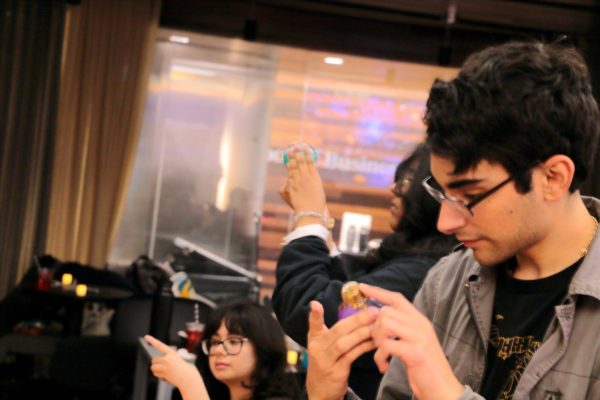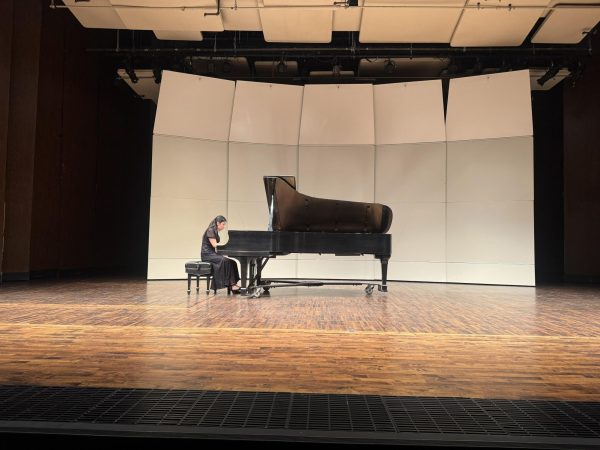SMTD students share experiences, issues during Varner renovations
Oakland University’s new West Campus (OWC) is located at 1500 University Drive, just two miles west of the main campus. The building is a shared space with Baker College, and houses the Oakland University School of Music, Theatre and Dance.
A little over two months ago, Oakland University’s West Campus (OWC) opened its doors to the School of Music, Theatre and Dance (SMTD).
The theatre and music departments are mainly utilizing the OWC space, while also using Varner Hall and the Recreation Center.
Transportation was a problem which has already been addressed, but it stretches further than the SMART Flex vehicles currently available to students. Students are having problems trying to travel to classes on time between the different locations, in addition to facing parking issues.
“You’ve got to get back to your car and then drive all the way over to OWC,” junior Phillip Christiansen said. “That makes [back to back classes] not possible, especially if you need to take both classes — you really can’t as easily, because you’re going to be getting there late every time.”
“The Varner lot has always been jammed, but the added factor of all the construction workers parked there as well as the people from Meadow Brook at the scene shop parked where they’re renovating — it just takes up student parking,” he added.
For theatre majors like Christiansen — as well as theatre design and technology majors — their backpacks are heavy from things like costume pieces. They no longer have access to lockers to put away their bags and other belongings, so they have to carry everything around to each location. For junior Amanda Pordon, this means toting her stage management kit around.
“I was lugging a basket around wherever I went,” Pordon said. “[…] I was walking around campus, I was sitting in the OC — that was really frustrating, because I had to carry it back and forth.”
Having classes located predominantly at OWC makes it difficult for students like Pordon to get work done, as well as to get things together for classes. They don’t have access to printers at OWC, and the Wi-Fi is Baker’s Wi-Fi, which means students have to sign in everyday to use it.
Another issue is the lack of a cafeteria or food services at OWC, with the lack of lockers also meaning no food storage. Food trucks have been brought in, but they are expensive. Vending machines have finally been put in place.
Asides from technical problems, there have been communication issues for students and faculty regarding things like rehearsal spaces and missing pieces for shows. For the show “She Kills Monsters,” the space was being shared with the choir, so they would have to adjust on the spot — but with communication struggles, it wasn’t as simple.
“Every problem pretty much required a next day solution, [but] half the time they couldn’t be solved right then and there,” Christiansen said. “We’re in a completely different space than the places that we would make or create or solve these things.”
One solution to the problem was the addition of a digital callboard, a system where a message gets typed and shared with all those involved with a particular project.
The communication problems are still alive, but the faculty and students are trying. According to Christiansen, it appears everyone is “equally confused” in terms of miscommunication from everyone involved.
Students had to innovate with the running of “She Kills Monsters,” through efforts like turning a small kitchen area within the show space into a quick change area. The backstage space is bigger than Varner’s Studio Theatre, but it wasn’t just the setup that was different — the teardown differed, as well.
“The strike’s [deconstruction of a set] been a different process, because we have to cart things across the freeway instead of just taking it from one side of campus to the other,” Pordon said. “We only really have a small little trailer and part of a truck to move things.”
Christiansen and Pordon both agree the thing that has helped most during this process is the togetherness of the crew all supporting each other during these trying times. In addition to student support, the opportunity and experience are unmatched with all the problems students are facing.
The music department faced obstacles of their own in light of Varner renovations.
“As soon as they said the renovations were happening, it changed everything,” senior music education major Olivia Friedenstab said.
While the introduction of OWC creates more tension for all of SMTD, the department of music had to adapt to renovations immediately. Last winter, ensembles rehearsed in the Hillcrest multi-purpose space, prompting the department to move expensive equipment into an unfamiliar domain. Luckily, this was only temporary, and instrument ensembles got back their typical rehearsal space in Varner this fall — though this came with a set of challenges of its own.
Out of traveling to and from OWC comes an issue of tardiness. Similar to theatre students, music students find difficulties in making it to class on time. For music students in particular, the classes they are struggling to be on time for are ensembles which require the entire group to be ready by the start of class.
“For example, we have students coming over from West Campus to Wind Symphony,” junior music education major Jessie Pruehs said. “They can’t change when their class ends, but they don’t arrive early enough to be ready for rehearsal, and so our rehearsal doesn’t actually start at noon, it starts at 12:10 or 12:05 sometimes. It is what it is — we just have to keep going forward.”
Staff, however, are understanding of these new circumstances, and thankfully students are not penalized for showing up late to classes as much as before. Still, five to ten minutes of valuable time being taken away from the group at large raises frustration, especially due to the nature of ensemble classes being dedicated time for rehearsal.
While music students make the weekly hike out to OWC for classes, lessons and studios, most of their challenges come as a result of the renovations happening at Varner. Much of the situation consists of inconveniences that music students learned to comply with, but issues such as the lack of proper sound-proofing and central heating pose major risks for students and their instruments.
Not only do the renovations compromise rehearsal and performance spaces, but they also infringe on the sentiments these spaces bare. Typically, music students would have ample opportunities to perform in the Varner Recital Hall, but due to renovations this is something they are being deprived of. This is especially unfortunate for graduating seniors whose chances were shot in the heat of the pandemic.
“It’s likely that the recital hall will not be finished before I graduate,” said Friedenstab. “I got to play in that space two, maybe three times — it really sucks […] that I’m not going to be able to play at home one last time.”
Instead, performance spaces this semester are spread across various venues, including churches, high school auditoriums and the Macomb Community College Performing Arts Center.
Because of the distance music students needed to travel for their October concert, classes were canceled for the day in order to assist in moving equipment to and from the performance venue. On top of missing valuable class time, some students ended up having to drive an hour or so home after a long day of setting up, rehearsing and performing a concert — all of this on top of their usual classwork.
“It’s this balance of any musician should be able to take any space they’re in and work with it, but also, it’s just another thing that’s compounding our frustration with everything happening,” Pruehs said.
Music and theatre students alike acknowledge that the renovations are necessary, but can’t help but feel it stands in the way of the quality of education and experience needed.



